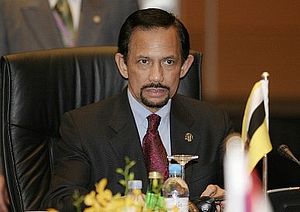On April 20, the Bank of China Hong Kong Limited (BOCHK) was granted regulatory approval by Brunei’s Monetary Authority to open a branch in the sultanate, making it the first Chinese financial institution to do so. While China’s penetration into Brunei’s economy is not new, the move will be read as a sign of Beijing’s growing presence in the country.
According to Gao Yan, China’s vice minister of commerce, BOCHK is the first Chinese financial institution to establish a presence in the tiny sultanate of over 4 million. The branch opening is said to mark a “new phase” of bilateral financial cooperation between Brunei and China.
China is far from a new player in Brunei; it is already one of the biggest investors in the Southeast Asian state. Its investments include the construction of a $4 billion crude oil refinery at Pulau Muara Besar, Brunei’s largest island, and plans to establish the Brunei-Guangxi Economic Corridor with $500 million in joint investments.
The deal has been advertised as being mutually beneficial for both sides. In a statement, BOCKH described Brunei as one of the most important countries along the Belt and Road route, as it is “politically stable and strategically located.” Beyond economics, Dr. Mustafa Izzuddin, a political scientist at the ISEAS-Yusof Ishak Institute in Singapore, opines that China also considers Brunei as an important country on ASEAN matters.
As China’s fourth-largest state-owned lender, BOCHK actions are naturally aligned with China’s geo-strategic goals under President Xi Jinping’s “One Belt, One Road” initiative. The maritime component of Xi’s initiative aims to create economic and commercial corridors to increase economic connectivity between maritime Southeast Asia, Oceania, and countries in the wider Indian Ocean area, with the Chinese mainland.
For Bandar Seri Begawan’s point of view, BOCHK is set to facilitate investment and funding of development projects that will benefit local infrastructure, and is likely to hire locals because of the “cost factor,” according to Dato Paduka Dr Hj Mohd Amin Liew Abdullah, Brunei’s deputy minister of finance.
In the same interview, the minister said that BOCHK’s entry gives a much-needed “vote of confidence” for Brunei’s struggling economy in a low oil-price environment. Bank of China Group, listed as the fourth largest bank worldwide in terms of “Tier 1” capital, owns BOCHK. According to Brunei’s Monetary Authority, the bank has been given credit ratings of A, A+ and Aa3 respectively by ratings agencies Fitch IBCA, Moody’s, and Standard & Poor’s. The development of the financial sector is also a way for the Bruneian government to strategically diversify its oil-dependent economy in the face of dwindling reserves.
Lin Jing Zhen, deputy chief of BOCHK, said that preparations to open the Brunei branch are in “full swing.” Brunei’s Central Bank, commenting on discussions between the country’s Monetary Authority and BOCHK, has indicated a tentative timeframe for banking operations to start before the end of 2016.
Bilateral trade between Brunei and China stood at $1.79 billion in 2013.
China’s growing economic footprint in Asia is commensurate with its burgeoning economic clout, but investment is also state-led and in service of grand strategy. Bank of China has also opened branches in Thailand during the year. Smaller states like Brunei have found it hard to pass up investments opportunities with potential to jumpstart its ailing economy, despite having claims on the South China Sea features that are in conflict with China’s nine-dash line claim. Brunei only claims the Louisa Reef in the Spratlys, based on its continental shelf.

































